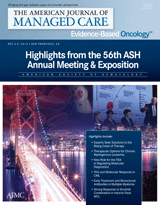- Center on Health Equity & Access
- Clinical
- Health Care Cost
- Health Care Delivery
- Insurance
- Policy
- Technology
- Value-Based Care
Data Show High Response Rate to Ibrutinib Combination for Patients With Hard-to-Treat MCL
Results presented December 8, 2014, at the 56th Annual Meeting of the American Society of Hematology (ASH) show that 88% of patients with relapsed or refractory mantle cell lymphoma (MCL) responded to a combination of ibrutinib and rixtuxmab.
The phase 2 trail, led by Michael Wang, MD, of the University of Texas MD Anderson Cancer Center in Houston, found responses in 40 of 46 patients, with a complete response (CR) in 40%.1 The trial also revealed an apparent marker for who will benefit most from the combination. Results found that in 34 evaluable patients with levels of less than 50% of the Ki-67 protein, the overall response rate (ORR) was 100%. Conversely, 10 patients who discontinued treatment when their MCL progressed had Ki-67 levels above 60%.1
Ibrutinib, being developed as Imbruvica by Pharmacyclics and Janssen Biotech,Inc, may offer an option in combination for patients whose MCL is especially difficult to treat, Wang said.2 Previously, Wang and colleagues reported a 68% ORR in patients with relapsed/ refractory MCL when ibrutinib was used as a monotherapy.3
“The positive outcomes seen with Imbruvica in combination with rituximab reinforce our decision to pursue its full potential as a single agent and in combination with other therapies, and underscores the potential Imbruvica may offer to patients living with hematologic malignancies,” said Danelle James, MD, MS, vice president, clinical development, Pharmacyclics.3
LONG-TERM DATA SHOW SAFETY, DURABILITY
or refractory MCL who were treated with
ibrutinib for more than 2 years remained
progression-free with no new or unexpected
adverse events (AEs), according
to results presented December 8, 2014, at
ASH.4 This second phase 2 trial looked at
ibrutinib’s safety and efficacy as a monotherapy
in MCL patients who had previously
been treated with rituximab combination
therapy and at least 2 cycles of
bortezomib. Of the 111 patients in the
original study, 47% were still alive at the
at the time of data cutoff.4
More than 30% of patients with relapsed
IBRUTINIB AFTER OTHER THERAPY
from a phase 2, multi-center, single-
arm trial (MCL2001) that investigated
once-daily ibrutinib in 120 patients with
relapsed/refractory MCL who previously
had received a rituximab-containing
treatment regimen and had progressed
after at least 2 cycles of bortezomib.5
Wang also presented a poster with results
An independent review committee
found that the ORR, which was the primary
endpoint, was 63% after a median
follow-up of 14.9 months, and 21% of the
patients achieved a complete response.
Secondary endpoints included duration
of response (DOR), progression-free survival
(PFS), overall survival (OS), and safety.
Median DOR based on the committee’s
assessment was 14.9 months, and
the median time to first response was
2.1 months. The median PFS was 10.5
months, with 47% of patients remaining
progression-free at 1 year. The median
PFS has not yet been reached. The OS
rate at 18 months was 61%.5
EBO
The most frequently reported AEs of any grade were fatigue (43%) and diarrhea (43%). Diarrhea, when observed generally occurred early after initial treatment, but resolved quickly and was not treatment limiting. The majority of AEs were grade 1 and 2. The most common AEs ≥ grade 3 were neutropenia (21%), thrombocytopenia (13%), and pneumonia (13%). Atrial fibrillation was reported in 13 patients (11%); 6 patients (5%) experienced Grade 3 or 4 atrial fibrillation which resolved in 1 to 4 days. Five of these 6 patients had a history of atrial fibrillation.5
References
1. Wang M, Hagemeister F, Westin JR, et al. Ibrutinib and rituximab are an efficacious and safe combination in relapsed mantle cell lymphoma: prelimary results from a phase 2 clinical trial. Blood. 2014;124(21):abstract 627.
2. Imbruvica (ibrutinib) in combination with rituximab data shows positive benefit-risk profile in hematologic malignancy [press release]. San Francisco, CA: Pharmacyclics; December 8, 2014.
3. Wang M, Rule S, Martin P, et al. Targeting BTK with ibrutinib in relapsed or refractory mantle-cell lymphoma. N Engl J Med. 2013;369:507-516.
4. Imbruvica (ibrutinib) data demonstrates safety and durability of responses at 2-year follow-up in mantle cell lymphoma [press release]. San Francisco, CA: Pharmcyclics; December 8, 2014.
5. Wang M, Goy A, Martin P, et al. Efficacy and safety of single-agent ibrutinib in patients with mantle cell lymphoma who progressed after bortezomib therapy. Blood. 2014;124(21):abstract 4471.

Exploring Racial, Ethnic Disparities in Cancer Care Prior Authorization Decisions
October 24th 2024On this episode of Managed Care Cast, we're talking with the author of a study published in the October 2024 issue of The American Journal of Managed Care® that explored prior authorization decisions in cancer care by race and ethnicity for commercially insured patients.
Listen
HEDIS Glycemic Goal Achieved Using Control-IQ Technology
December 22nd 2025A greater proportion of patients with type 1 diabetes who used automated insulin delivery systems vs multiple daily injections achieved the Healthcare Effectiveness Data and Information Set (HEDIS) glycemic measure.
Read More

